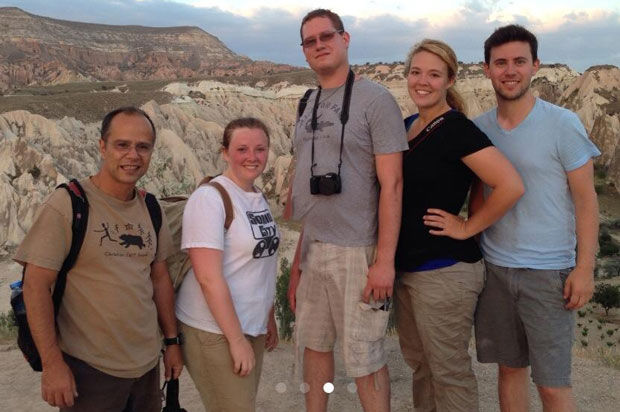ISIS actions influence themed semester event
Photo courtesy of Beth Hammons
From left to right: David Romano, Cora Caton, David James, Elizabeth Hammons and Jon Sabella spent three weeks exploring Turkey together.
The Turkish border region near Kobani, Syria, has been headline news for weeks as the extremist militant group ISIS attempts to gain control of the region. The public beheading of American journalists brought ISIS to American front pages and TV screens.
Missouri Southern students can learn more about the background of this conflict through the highly topical themed semester presentations by Dr. David Romano, associate professor of political science at Missouri State University. “Conflict, Democratization and the Kurdish Issue in Turkey” will be held at Corley Auditorium on Friday, Oct. 31, at 9 a.m.
“My objective is going to be mostly to try to explain to the audience why different actors in the region do what they do … and what I think needs to be done,” said Romano.
Romano has been a regular columnist for the Turkish website Rudaw, at rudaw.net/english, since 2010. He is the Thomas G. Strong Professor of Middle East Politics at Missouri State and author of The Kurdish Nationalist Movement (2006, Cambridge University Press) and co-editor with Mehmet Gurses of the forthcoming Conflict, Democratization and the Kurds in the Middle East (2014, Palgrave Macmillan).
With a population of some 30-40 million in Turkey, Iran, Iraq and Syria, Romano said, the Kurds are the world’s largest stateless nation. His first presentation will explore the history of the “Kurdish issue” in Turkey and neighboring countries.
The Kurds are currently the strongest opposition force to face the ISIS terrorists in the Turkish region. They have done so without the aid of the Turkish government. Romano believes the decision by the White House to provide arms and ammunition to the Syrian Kurds in Kobani was a show of strong leadership, one he has been looking for from the president.
“… giving arms to the Kurds, which we are now doing, not just to the Iraqi Kurds, but to the Syrian Kurds as well, it’s the right call to make,” said Romano.
The second scheduled session, “Wire-taps, Scandals, Protests and Turkey’s Run-Away Democracy Train,” at 11 a.m., details a corruption scandal that began late last year with accusations of increasing authoritarianism on the part of the Turkish government. Recent developments include that the newly appointed prosecutor has dropped all charges against the government.
“Not all elected governments are equal in terms of democratic standards,” Romano said.
At 1 p.m. Romano will present a third lecture, “On the Eve of the 100-Year Anniversary of the Armenian Genocide − What Have We Learned?” This presentation details an event that took place in what is now Turkey nearly a century ago: the killing of some 1.5 million Ottoman Armenians. According to the themed semester pamphlet, this session will explore several questions: Why was the Armenian minority targeted by the Ottoman authorities, what did all this have in common with other genocides and mass killings, and what does acknowledging a genocide mean?
Your donation will support the student journalists of Missouri Southern State University. Your contribution will allow us to purchase equipment and cover our annual website hosting costs.




























